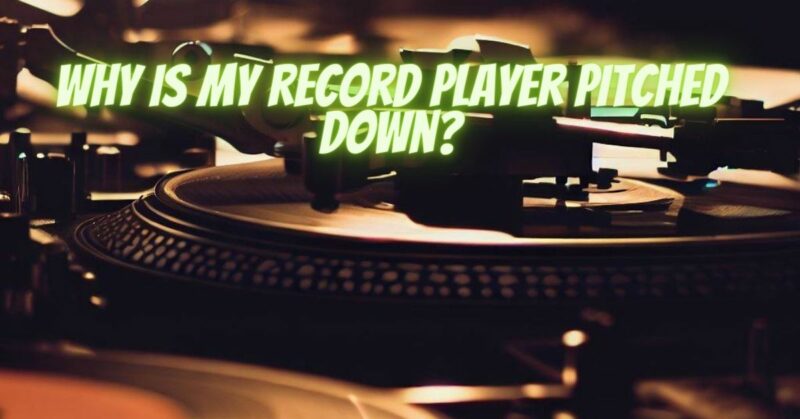Listening to vinyl records can be a rewarding and immersive experience, but occasionally, vinyl enthusiasts encounter a perplexing problem: their record player’s pitch seems to be lower than it should be, resulting in a pitched-down sound. This issue can significantly affect the enjoyment of your vinyl collection. In this article, we will explore common reasons behind why your record player may produce a pitched-down sound and provide insights into troubleshooting and resolving this problem.
Understanding Turntable Speed and Pitch
The speed at which a record player’s platter rotates is critical to maintaining the proper pitch of the music. Vinyl records are designed to be played at specific speeds, primarily 33 1/3 RPM (revolutions per minute) for LPs (long-playing records) and 45 RPM for singles and certain albums. When your record player operates at the wrong speed, it results in a noticeable pitch variation, often referred to as being “pitched down.”
Common Causes of Pitched-Down Sound
Several factors can contribute to a record player producing a pitched-down sound:
- Belt-Drive or Direct-Drive: Record players can be classified into two main types: belt-drive and direct-drive. Belt-driven turntables use a belt to connect the motor to the platter, while direct-drive turntables have the motor directly integrated into the platter. Belt-driven turntables may experience speed fluctuations if the belt becomes worn, stretched, or misaligned.
- Motor Issues: The turntable’s motor plays a crucial role in maintaining the correct rotation speed. Malfunctions or inconsistencies in the motor’s operation can result in speed variations. This may be due to worn motor bearings, electrical issues, or a malfunctioning speed control mechanism.
- Power Supply Problems: Inconsistent or inadequate power supply to the turntable motor can cause speed fluctuations. Ensure that your turntable is plugged into a stable power source, and consider using a voltage regulator if necessary.
- Stylus and Tonearm: Stylus and tonearm issues, such as improper calibration or balance, can introduce drag on the record’s surface, affecting playback speed and pitch.
- Maintenance: The lack of regular maintenance can lead to speed inconsistencies. It’s essential to clean and lubricate the turntable’s moving parts, including the platter bearing, to ensure smooth and consistent rotation.
Troubleshooting and Resolving Pitched-Down Sound
If your record player produces a pitched-down sound, consider the following troubleshooting steps:
- Check Belt Tension: For belt-drive turntables, inspect the condition of the belt. It should have the correct tension, neither too tight nor too loose. Replace it if it appears worn or stretched.
- Motor Inspection: Examine the turntable’s motor for visible damage or irregularities. If the motor is malfunctioning, consult a professional technician for repairs or replacement.
- Power Supply: Ensure a stable power supply for your turntable, free from voltage fluctuations. Using a dedicated outlet or a voltage regulator can help.
- Stylus and Tonearm: Verify that your stylus and tonearm are properly calibrated and balanced. Adjust them according to your turntable’s specifications to minimize drag.
- Clean and Lubricate: Regularly clean and lubricate the turntable’s moving parts, including the platter bearing, to ensure smooth rotation.
- Isolation: Place your turntable on an isolation platform or shelf designed to absorb vibrations and minimize external interference.
A pitched-down sound from your record player can be an irritating issue, but with careful troubleshooting, it’s often possible to diagnose and resolve the problem. By addressing common causes such as belt tension, motor issues, power supply, stylus and tonearm calibration, and regular maintenance, you can restore your turntable’s performance and enjoy your vinyl collection with the correct pitch. If the issue persists despite troubleshooting, consider consulting a professional turntable technician for more in-depth diagnosis and repairs.


